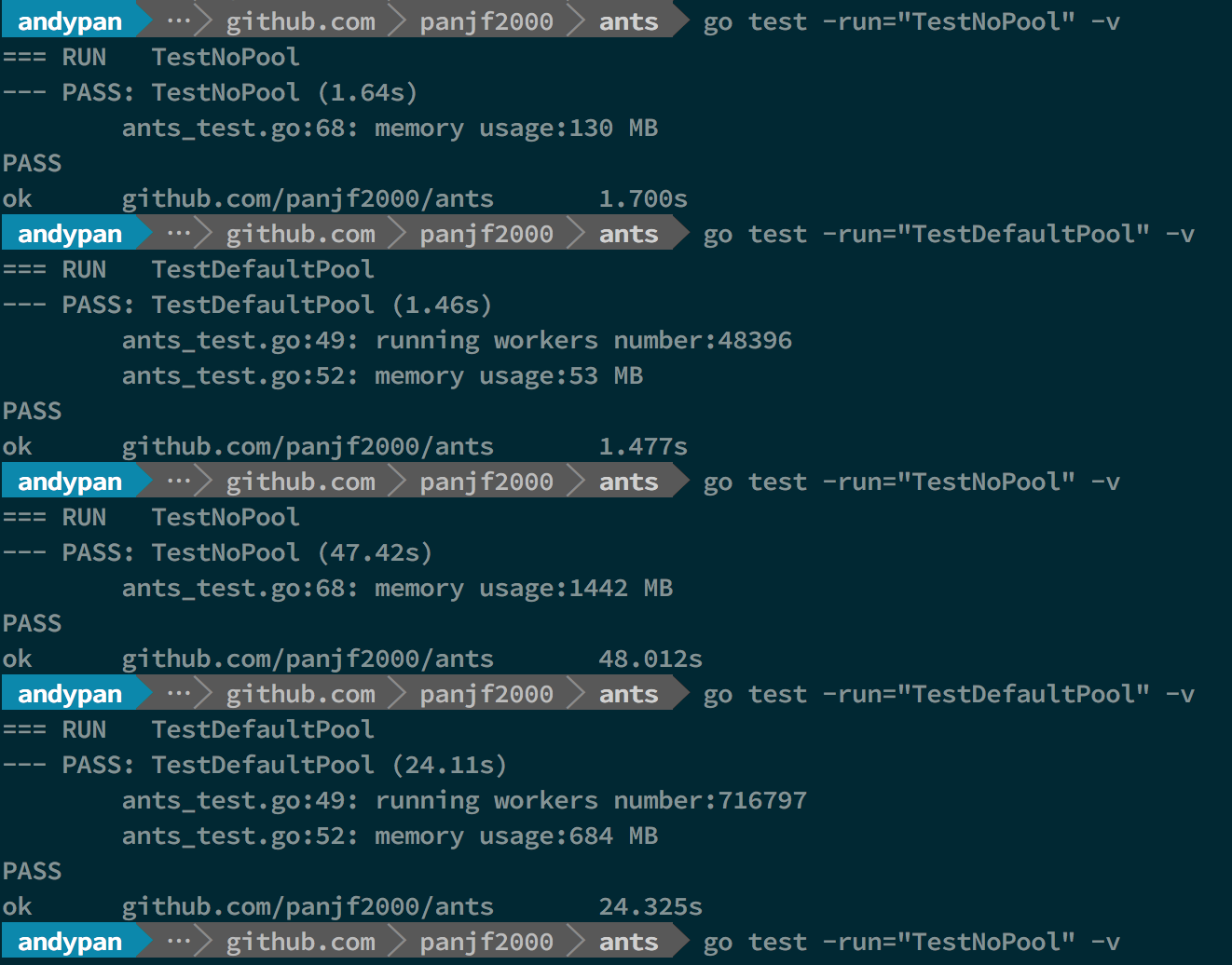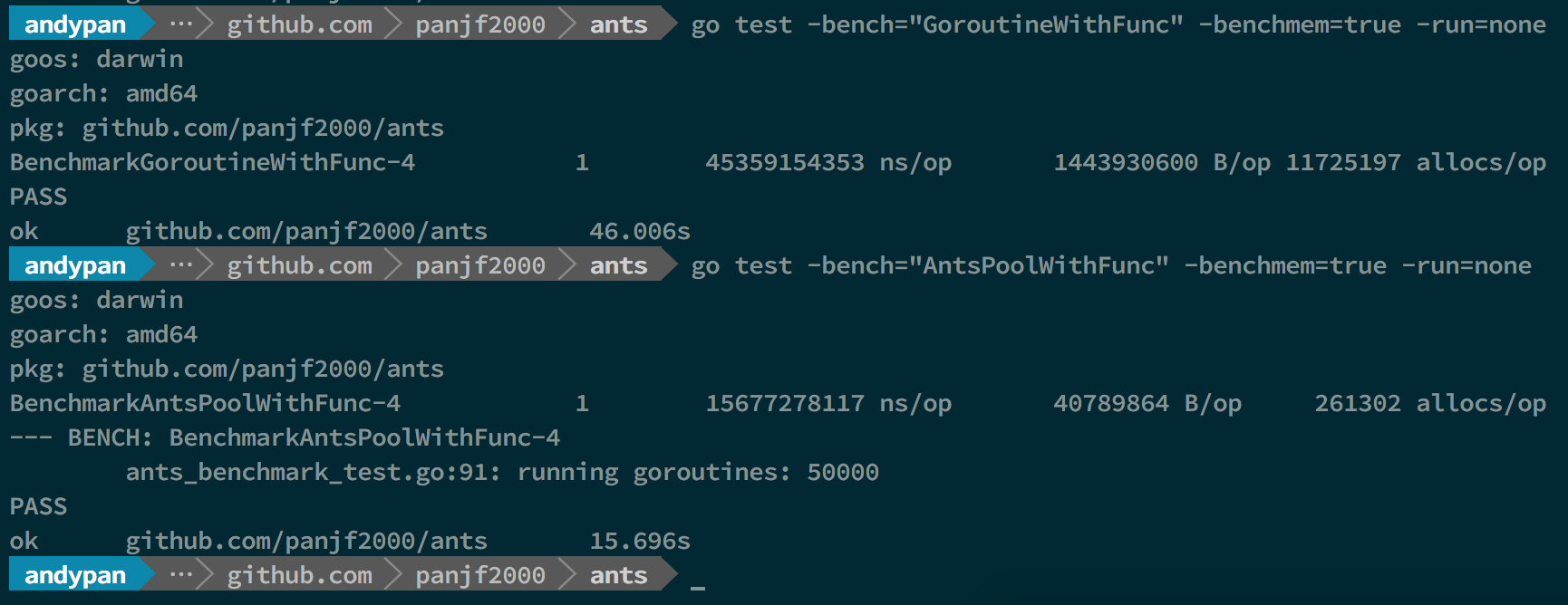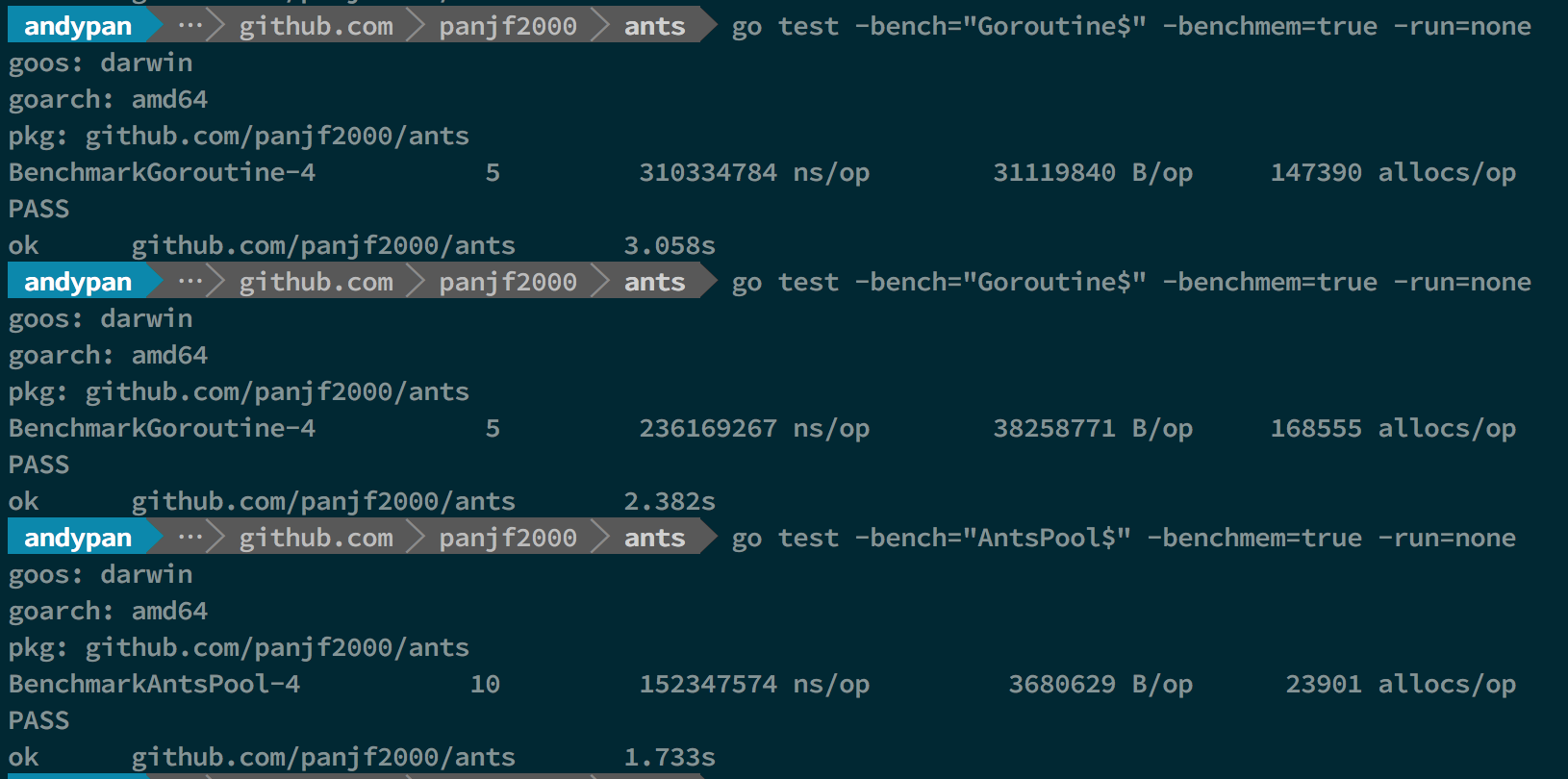8.0 KiB
ants

A goroutine pool for Go
ants是一个高性能的协程池,实现了对大规模goroutine的调度管理、goroutine复用,允许使用者在开发并发程序的时候限制协程数量,复用资源,达到更高效执行任务的效果。
功能:
- 实现了自动调度并发的goroutine,复用goroutine
- 定时清理过期的goroutine,进一步节省资源
- 提供了友好的接口:任务提交、获取运行中的协程数量、动态调整协程池大小
- 优雅处理panic,防止程序崩溃
- 资源复用,极大节省内存使用量;在大规模批量并发任务场景下比原生goroutine并发具有更高的性能
目前测试通过的Golang版本:
- 1.8.x
- 1.9.x
- 1.10.x
- 1.11.x
- master
安装
go get -u github.com/panjf2000/ants
使用包管理工具 glide 安装:
glide get github.com/panjf2000/ants
使用
写 go 并发程序的时候如果程序会启动大量的 goroutine ,势必会消耗大量的系统资源(内存,CPU),通过使用 ants,可以实例化一个协程池,复用 goroutine ,节省资源,提升性能:
package main
import (
"fmt"
"sync"
"sync/atomic"
"time"
"github.com/panjf2000/ants"
)
var sum int32
func myFunc(i interface{}) {
n := i.(int32)
atomic.AddInt32(&sum, n)
fmt.Printf("run with %d\n", n)
}
func demoFunc() {
time.Sleep(10 * time.Millisecond)
fmt.Println("Hello World!")
}
func main() {
defer ants.Release()
runTimes := 1000
// Use the common pool.
var wg sync.WaitGroup
syncCalculateSum := func() {
demoFunc()
wg.Done()
}
for i := 0; i < runTimes; i++ {
wg.Add(1)
ants.Submit(syncCalculateSum)
}
wg.Wait()
fmt.Printf("running goroutines: %d\n", ants.Running())
fmt.Printf("finish all tasks.\n")
// Use the pool with a function,
// set 10 to the capacity of goroutine pool and 1 second for expired duration.
p, _ := ants.NewPoolWithFunc(10, func(i interface{}) {
myFunc(i)
wg.Done()
})
defer p.Release()
// Submit tasks one by one.
for i := 0; i < runTimes; i++ {
wg.Add(1)
p.Serve(int32(i))
}
wg.Wait()
fmt.Printf("running goroutines: %d\n", p.Running())
fmt.Printf("finish all tasks, result is %d\n", sum)
}
与http server集成
package main
import (
"io/ioutil"
"net/http"
"github.com/panjf2000/ants"
)
type Request struct {
Param []byte
Result chan []byte
}
func main() {
pool, _ := ants.NewPoolWithFunc(100, func(payload interface{}) {
request, ok := payload.(*Request)
if !ok {
return
}
reverseParam := func(s []byte) []byte {
for i, j := 0, len(s)-1; i < j; i, j = i+1, j-1 {
s[i], s[j] = s[j], s[i]
}
return s
}(request.Param)
request.Result <- reverseParam
})
defer pool.Release()
http.HandleFunc("/reverse", func(w http.ResponseWriter, r *http.Request) {
param, err := ioutil.ReadAll(r.Body)
if err != nil {
http.Error(w, "request error", http.StatusInternalServerError)
}
defer r.Body.Close()
request := &Request{Param: param, Result: make(chan []byte)}
// Throttle the requests traffic with ants pool. This process is asynchronous and
// you can receive a result from the channel defined outside.
if err := pool.Serve(request); err != nil {
http.Error(w, "throttle limit error", http.StatusInternalServerError)
}
w.Write(<-request.Result)
})
http.ListenAndServe(":8080", nil)
}
任务提交
提交任务通过调用 ants.Submit(func())方法:
ants.Submit(func(){})
自定义池
ants支持实例化使用者自己的一个 Pool ,指定具体的池容量;通过调用 NewPool 方法可以实例化一个新的带有指定容量的 Pool ,如下:
// Set 10000 the size of goroutine pool
p, _ := ants.NewPool(10000)
// Submit a task
p.Submit(func(){})
动态调整协程池容量
需要动态调整协程池容量可以通过调用Tune(int):
pool.Tune(1000) // Tune its capacity to 1000
pool.Tune(100000) // Tune its capacity to 100000
该方法是线程安全的。
销毁协程池
pool.Release()
Benchmarks
系统参数:
OS: macOS High Sierra
Processor: 2.7 GHz Intel Core i5
Memory: 8 GB 1867 MHz DDR3
Go Version: 1.9

上图中的前两个 benchmark 测试结果是基于100w任务量的条件,剩下的几个是基于1000w任务量的测试结果,ants的默认池容量是5w。
-
BenchmarkGoroutine-4 代表原生goroutine
-
BenchmarkPoolGroutine-4 代表使用协程池
ants
Benchmarks with Pool
这里为了模拟大规模goroutine的场景,两次测试的并发次数分别是100w和1000w,前两个测试分别是执行100w个并发任务不使用Pool和使用了ants的Goroutine Pool的性能,后两个则是1000w个任务下的表现,可以直观的看出在执行速度和内存使用上,ants的Pool都占有明显的优势。100w的任务量,使用ants,执行速度与原生goroutine相当甚至略快,但只实际使用了不到5w个goroutine完成了全部任务,且内存消耗仅为原生并发的40%;而当任务量达到1000w,优势则更加明显了:用了70w左右的goroutine完成全部任务,执行速度比原生goroutine提高了100%,且内存消耗依旧保持在不使用Pool的40%左右。
Benchmarks with PoolWithFunc
因为PoolWithFunc这个Pool只绑定一个任务函数,也即所有任务都是运行同一个函数,所以相较于Pool对原生goroutine在执行速度和内存消耗的优势更大,上面的结果可以看出,执行速度可以达到原生goroutine的300%,而内存消耗的优势已经达到了两位数的差距,原生goroutine的内存消耗达到了ants的35倍且原生goroutine的每次执行的内存分配次数也达到了ants45倍,1000w的任务量,ants的初始分配容量是5w,因此它完成了所有的任务依旧只使用了5w个goroutine!事实上,ants的Goroutine Pool的容量是可以自定义的,也就是说使用者可以根据不同场景对这个参数进行调优直至达到最高性能。
吞吐量测试(适用于那种只管提交异步任务而无须关心结果的场景)
10w 任务量
100w 任务量
1000w 任务量
1000w任务量的场景下,我的电脑已经无法支撑 golang 的原生 goroutine 并发,所以只测出了使用ants池的测试结果。
从该demo测试吞吐性能对比可以看出,使用ants的吞吐性能相较于原生goroutine可以保持在2-6倍的性能压制,而内存消耗则可以达到10-20倍的节省优势。




